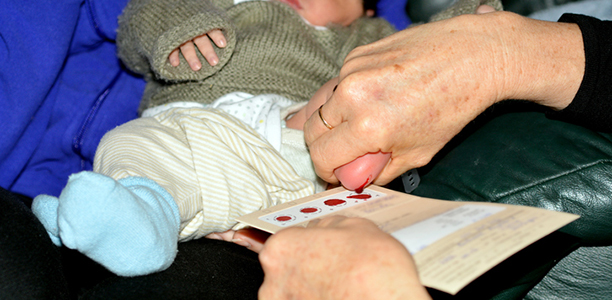
Dr Jovanka King, a speaker at the Royal College of Pathologists of Australasia’s (RCPA) annual conference, ‘Pathology Update 2018’, will recommend that newborn screening is expanded to include testing for severe immunodeficiency diseases. Dr King will discuss her research on strategies for screening newborn babies for primary immunodeficiency diseases (PID), including Severe Combined Immunodeficiency (SCID), a life-threatening condition where babies are born without a functional immune system.
Dr King, a specialist paediatric immunologist and immunopathologist at SA Pathology at the Women’s and Children’s Hospital, and the University of Adelaide explains that this additional screening would significantly improve the outcome for children affected by these disorders, in terms of survival and wellbeing, and anticipates that it would be cost-effective.
“Screening babies for primary immune deficiency disorders, including SCID, and evaluating how these tests can be implemented in each state’s newborn screening service should be a health priority in Australia. Conditions such as SCID are life-threatening, therefore making a diagnosis and starting treatment as early as possible is essential. Achieving a diagnosis is typically delayed, therefore babies become critically unwell as a result of severe, recurrent infections and other complications. In these cases, they frequently require prolonged hospital and intensive care unit admissions.
“SCID can be cured by a bone marrow or stem cell transplant. There is evidence that if infants with SCID undergo transplantation prior to the age of 3.5 months, their outcomes in terms of survival and long-term health are much improved. Beyond this age, affected babies have a higher burden of infection and other complications due to their untreated disease. The only realistic way to achieve the goal of early transplantation for babies with SCID is to diagnose them early in the newborn period before they develop symptoms of the disease. This is only achievable through newborn screening.
“The current process for screening newborns in Australia involves each baby having a heel prick blood test when they are between two and three days old. That blood sample is blotted onto a piece of filter paper and is sent to specialised neonatal screening laboratories for testing. Babies are currently screened for over 40 different conditions, including inborn errors of metabolism and cystic fibrosis, but with recent technological advances we have the potential to expand this further to screen for other important conditions.”
Dr King’s research has included analysing data from a newborn screening program for PID conducted in Sweden, where almost 60,000 newborn babies were screened for SCID and other forms of PID over a two-year period.
“Our research from Sweden, where I worked previously, has demonstrated that population-based newborn screening is an effective way in which to identify babies affected by PID. Affected infants were detected by an abnormal screening test, which enabled rapid medical assessment, confirmatory testing and commencement of treatment within the first weeks of life. This has also been demonstrated in similar studies performed in other countries throughout the world.
“New Zealand recently initiated their screening program for SCID, and almost every state in the United States, and many countries throughout Europe, the Middle East and Asia have initiated successful screening programs for PID, which have become routine. There is a clear need to establish a newborn screening program for PID in Australia,” says Dr King.
In collaboration with other children’s hospitals throughout Australia, Dr King will be conducting a cost-benefit analysis which is expected to be completed later in the year. Doctor King believes that not only would this new screening test be beneficial for affected infants and their families around the country, it would also be cost-effective.
“The biggest barrier to implementing any new testing strategy is cost, however, economic analyses performed in other countries have demonstrated that it is more cost effective to screen newborns for SCID than it is to manage a critically unwell child in whom diagnosis and treatment were delayed, which is costly to health systems.”
For a disease to be included as part of a population-based screening program, it needs to meet certain criteria. Diseases need to be severe, and an effective treatment needs to be available. The testing strategy must also be robust and have been evaluated on a large scale.
“A retrospective study is underway in our laboratory in South Australia, where we are testing samples from our patients who were diagnosed with PID over the past 17 years. This will determine whether their disease could have been diagnosed in the first weeks of life, and hence if this testing strategy will be effective in our population. Following this, our aim is to secure funding to conduct a prospective screening study, where every baby born in South Australia will undergo screening for these immune deficiency diseases. There are over 300 different kinds of PID and, through our ongoing research efforts, we are also working on new strategies to improve our current capacity to diagnose these severe, life-threatening diseases and improve outcomes for affected patients,” explains Dr King.









